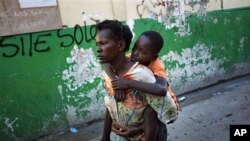U.S. medical researchers have identified the cholera strain responsible for the outbreak in Haiti, but they say it might be impossible to determine how the illness was introduced.
Haiti cholera outbreak
Since a massive earthquake hit Haiti in January, health experts have been on alert for the outbreak of serious illnesses in the Caribbean nation. The quake forced tens of thousands of people to flee damaged homes and live in tents, with little access to clean water and proper sanitation.
The U.S. Centers for Disease Control and Prevention, or CDC, deployed 250 health experts to Haiti earlier this year to help rebuild the government's public health services and watch for potential outbreaks of disease.
Jordan Tappero, who leads the CDC team in Haiti, says they quickly developed a list of major risks, such as diarrheal illness. "Cholera was on the list, even though I don't think people really thought cholera would be here because it hadn't been seen in centuries, if at all," he said.
Dr. Tappero says that in mid-October, Haiti's health ministry received the first news of people suffering from a cholera-like illness in the country's central Artibonite region.
"So when the first reports of illness suspicions for cholera arrived at the [health] ministry, within a few hours we had epidemiologists in the field collecting specimens. Within 48 hours, the laboratory in Haiti had confirmation of a cholera outbreak," Tappero explained.
Haiti's cholera DNA type
Further testing was conducted in Haiti and at CDC headquarters in Atlanta, Georgia to perform what experts call a DNA fingerprint of the water-borne bacterium. Earlier this month, officials confirmed that the illness was caused by a form of "vibrio cholerae" that is commonly found in South Asia, Africa and elsewhere.
Afsar Ali, a researcher at the University of Florida, has been traveling to Haiti to track the outbreak and help train health workers. In August, he identified communities along Haiti's coast as being at high risk for a cholera outbreak. Ali says brackish water, formed by fresh-water rivers dumping into the ocean, is a breeding ground for the bacterium.
"There is a mass tent very close to the river and ocean meeting site," I said this is the site where the cholera will happen, not the city. The city will come later. Those are the breeding grounds for cholera," Ali said.
Ali is familiar with the cholera strain found in Haiti because he researched it in his home country of Bangladesh, where cholera is endemic.
As he predicted, the outbreak in Haiti spread from rural areas to major cities like Port-au-Prince and Cap-Haitien. Cases of people contracting the illness in Haiti and then traveling to the Dominican Republic and the United States also have been reported.
Researchers say they are at the start of a long process of trying to understand the Haitian outbreak and how it started.
Controling contamination
Dr. Jordan Tappero of the CDC says the original source of infection might have been contaminated food or water, or a person carrying the bacterium. But, he says, the task of pinpointing the origin might be impossible.
"To really try to identify who was the individual that first suffered cholera or where that location was is nearly an impossible task, given the magnitude of the outbreak and the need for focusing energies to train health care providers to take care of cholera patients," Tappero said.
Researcher Afsar Ali says tracking the origin of the outbreak would require a broad environmental survey that could take years. In the meantime, he says experts should continue tracking the cholera to understand how it spreads and why it might sicken some people while leaving others unaffected. Another concern, Ali says, is how the bacterium is changing.
"With this kind of evolution, many things could happen, Ali says, "A more deadly bug can emerge or a highly antibiotic-resistant bug can emerge."
Health experts say the cholera outbreak will be nearly impossible to control in Haiti until sanitation and living conditions are improved for hundreds of thousands of people who were affected by the earthquake. They say people need to be educated in proper methods of boiling or treating water with chlorine, and the importance of hand washing.




